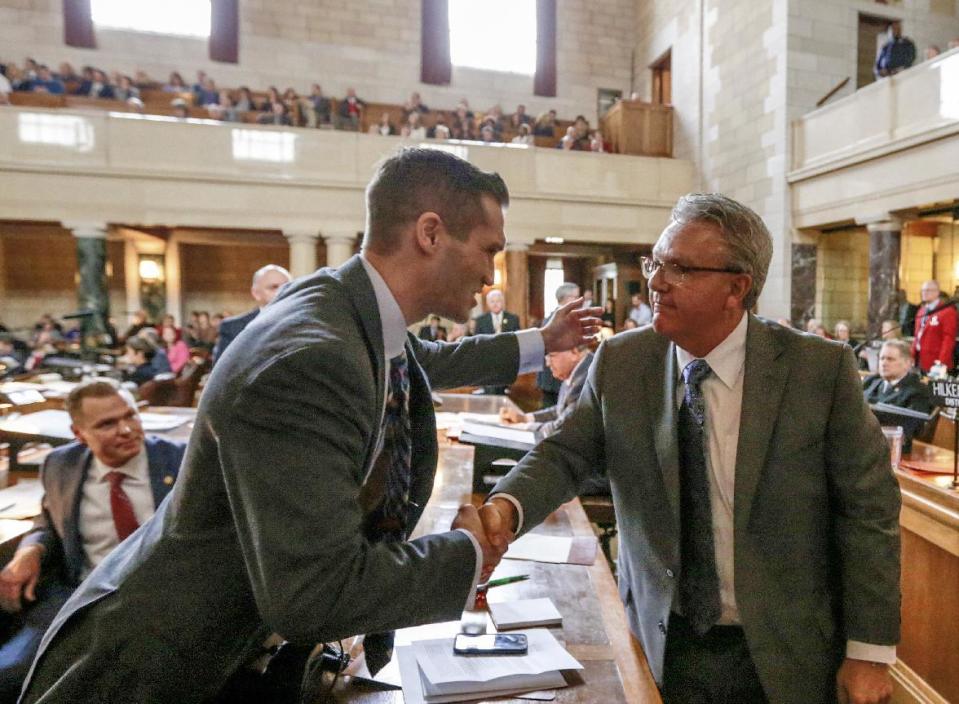30 days, 2 bills passed: Nebraska session marred by gridlock
LINCOLN, Neb. (AP) — Nebraska lawmakers like to ridicule Washington for its gridlock and partisan bickering, insisting that East Coast politicians should learn the "Nebraska way" of seeking pragmatic, common-sense solutions.
But despite having only a single, nonpartisan chamber, state senators have become so engrossed in an argument about debate rules that they have passed just two bills in a month, and there's no compromise in sight.
The deliberations in Lincoln are part of an effort to make it easier to overcome filibusters. All the talk has eaten up more than a third of the 90-day legislative session that began in January.
"This can't be Groundhog Day tomorrow," Speaker Jim Scheer said Wednesday as he implored lawmakers to work together. "We can't come with the same attitudes, the same misgivings, the same mistrust. We have to change ourselves."
If senators don't change course, the session could go down as one of the least productive in state history. Last year, senators had passed 26 bills by this point. In the 2015 session, they had approved nine measures. And in 2014, they adopted 18 proposals.
Filibusters are used by opponents when they don't have enough support to defeat bills on an up-or-down vote. The tactic has become more common in Lincoln in recent years, reaching a record-high of 24 filibusters last year, as debates grow increasingly contentious.
Because Nebraska lawmakers do not have formal party caucuses, no one can stop an individual senator or a small group from breaking ranks and mounting a filibuster. Conservative senators want to lower the threshold because it could make it easier to pass their top priorities, including a tax-cut package championed by Republican Gov. Pete Ricketts.
Progressive lawmakers and even some moderate Republicans say lowering the filibuster threshold would silence minority groups, be they Democrats in the deeply conservative state or rural senators in a Legislature where redistricting has shifted more political power to Omaha and Lincoln.
The Legislature remained at an impasse Wednesday after senators voted to continue operating under temporary debate rules from last year for another month. The vote will allow lawmakers to move on to other bills, but it does not resolve the dispute.
"It's a sad commentary on this session," said Sen. John McCollister, a Republican who is sometimes at odds with his party. "It's become so politicized. When I ran for election, one thing I talked about was how Nebraska isn't like Washington, D.C. We work together to pass legislation constructively."
The logjam is so great that some committees have not even bothered to vote on bills pending before them.
"Why disappoint folks?" said Sen. Mike Groene, the Republican chairman of the Education Committee. "You bring their bill to the floor, and it doesn't get heard."
Democratic Sen. Patty Pansing Brooks acknowledged that the filibuster has been used too frequently in recent years, but she argued that it was important to preserve minority rights. She hopes the rest of the session is more productive.
"We could have been talking about a lot more important things," she said.
Lawmakers came close to reaching an agreement on rules earlier this week when six senators huddled in private, but the deal fell apart shortly after it was announced. Previous attempts to reach a compromise have faltered in similar fashion because neither side wants to cede any ground.
The protracted floor fight may also be a reflection of the national rancor that exploded when Republican Donald Trump won the presidency.
"The rules debate, I think, is indicative of what's happened at the federal level," said Sen. Dan Watermeier, a Republican. "We've had a change in our environment."
Nebraska voters created the one-house Legislature in 1934 with the idea that it would be a more efficient and transparent way to conduct government business. U.S. Sen. George Norris, who came up with the idea, argued that state legislatures should not be partisan because most issues they face do not break down along party lines.
The Legislature has seen a dramatic shake-up in the last four years because of term limits and a 2016 election that booted nearly half a dozen incumbents out of office. Ricketts poured more than $116,000 of his own money into legislative races in the 2016 race to help conservative candidates.
Three centrist Republican senators lost to more conservative challengers, and two other Republicans were unseated by progressive Democrats. Because of term limits, 17 senators — more than one-third of the full Legislature — are serving their first year.
Additionally, the tone of this year's session turned sour on the first day when conservatives organized to sweep nearly all of the Legislature's committee chairmanships. Despite GOP dominance, committees have traditionally been led by a mix of Republican and Democrats. Some of those seats open this year had been sought by Democrats and moderate Republicans with more seniority.
Many of last year's filibusters were led by liberal senators blocking conservative-backed bills, such as a proposal to reinstate the winner-take-all system in presidential elections. But conservatives used them as well to derail a Medicaid expansion bill and a proposal to legalize marijuana.
___
Follow Grant Schulte on Twitter at https://twitter.com/GrantSchulte .




